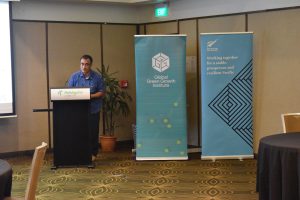

Suva, Fiji – 31 March 2022 – Stakeholders from government departments of Energy, Water and Buildings, as well as development partners and industry stakeholders, gathered today at an event to handover to the Government of Fiji the Sustainability Chapter developed by the Global Green Growth Institute (GGGI). The Sustainability Chapter will support government’s ongoing work to review its building code and ensure resilience and climate change considerations in building planning and design are mainstreamed.
 GGGI supported the Department of Buildings and Architects and the Department of Energy, to consult with industry bodies to ensure integration of the requirements from the Climate Change Act to the building code. As such, and in partnership with New Zealand´s Ministry of Foreign Affairs and Trade (MFAT) under the Low Emissions Climate Resilient Development (LECRD) program, GGGI provided technical assistance on this pressing issue, which culminated in the development of the Sustainability Chapter, as an addition to the Fiji National Building Code, to support implementation of Article 72 of the Climate Change Act. This development of the Chapter was supported by the following activities:
GGGI supported the Department of Buildings and Architects and the Department of Energy, to consult with industry bodies to ensure integration of the requirements from the Climate Change Act to the building code. As such, and in partnership with New Zealand´s Ministry of Foreign Affairs and Trade (MFAT) under the Low Emissions Climate Resilient Development (LECRD) program, GGGI provided technical assistance on this pressing issue, which culminated in the development of the Sustainability Chapter, as an addition to the Fiji National Building Code, to support implementation of Article 72 of the Climate Change Act. This development of the Chapter was supported by the following activities:
- Review of the existing building code and of other building sustainability codes and reports, including a building energy efficiency report based on a study in Fiji in 2014.
- Stakeholder engagement to determine scope and structure of the Sustainability Chapter.
- Consultative development process consisting of three validation workshops, as well as a public consultation process with complete draft posted in the government´s website for feedback.
 The result is a comprehensive and practical addition to the review of Fiji´s national building code in terms of sustainability, which contains four sections: adaptation, on how to minimize solar heat gain, maximize natural ventilation and safe siting for buildings; resilience, mainly focusing on enhancing building durability, mitigating flood damage, planning for outage of essential services and safe access/evacuation; mitigation, with an emphasis on building materials, improving efficiency, decarbonizing electricity and waste reduction; and, finally, a concluding section that discusses wellbeing and inclusion for building occupants. This includes guidance for ensuring mobility needs for persons with disabilities, differentiated need for adequate lighting, clear wayfinding, and access to sanitation facilities.
The result is a comprehensive and practical addition to the review of Fiji´s national building code in terms of sustainability, which contains four sections: adaptation, on how to minimize solar heat gain, maximize natural ventilation and safe siting for buildings; resilience, mainly focusing on enhancing building durability, mitigating flood damage, planning for outage of essential services and safe access/evacuation; mitigation, with an emphasis on building materials, improving efficiency, decarbonizing electricity and waste reduction; and, finally, a concluding section that discusses wellbeing and inclusion for building occupants. This includes guidance for ensuring mobility needs for persons with disabilities, differentiated need for adequate lighting, clear wayfinding, and access to sanitation facilities.
Fiji’s Climate Change Act was approved by Parliament on September 23, 2021, providing the legal framework to enable the country to take action towards climate change mitigation, adaptation, and disaster risk management. The Act charges the government to develop and implement a national climate change policy until 2030 and for successive periods of 10 years. Article 72 of the Act requires the review and, if necessary, amendment of content, expansion of scope, and scaling up of implementation and enforcement of the National Building Code immediately and every 5 years thereafter.
GGGI will continue working with the Ministry of Infrastructure and Meteorological Services (MIMS) and all other key government, development, and industry stakeholders, to keep supporting under the LECRD through capacity building and implementation tools to transform the building sector in Fiji to a sustainable and climate resilient one.
Find the Sustainability Chapter .
About GGGI and the Low Emissions Climate Resilient Development (LECRD) program
The Global Green Growth Institute (GGGI) is a treaty-based international, inter-governmental organization dedicated to supporting and promoting strong, inclusive and sustainable economic growth in developing countries and emerging economies. In close collaboration with the Climate Change and International Cooperation Division (CCICD) of the Ministry of Economy and funding from New Zealand´s Ministry of Foreign Affairs (MFAT), GGGI is implementing Low Emissions Climate Resilient Development (LECRD) program in Pacific Islands Countries.
The LECRD program supports regional resilience and emissions reduction by working with Pacific Islands Countries to transition to inclusive, low emissions and climate resilient development. As such, it promotes multi-stakeholder and innovative LECRD programmatic approaches that will leverage existing Pacific experiences to support governments integrate mitigation and adaptation planning, policies, and actions across sectors and national, local and community levels and multiple sectors.